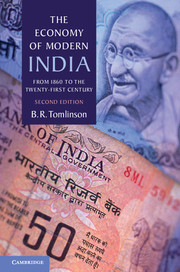Book contents
- The Economy of Modern India
- Series page
- The Economy of Modern India
- Copyright page
- Contents
- Figures
- Maps
- Tables
- Preface to the second edition
- Preface to the first edition
- Book part
- Chapter 1 Introduction:
- Chapter 2 Agriculture, 1860–1950:
- Chapter 3 Trade and manufacture, 1860–1945:
- Chapter 4 The state and the economy, 1939–1980
- Chapter 5 Breaking the mould? Economic growth since 1980
- Bibliographical essay
- Supplementary bibliography
- Index
Chapter 2 - Agriculture, 1860–1950:
Land, labour and capital
Published online by Cambridge University Press: 05 April 2013
- The Economy of Modern India
- Series page
- The Economy of Modern India
- Copyright page
- Contents
- Figures
- Maps
- Tables
- Preface to the second edition
- Preface to the first edition
- Book part
- Chapter 1 Introduction:
- Chapter 2 Agriculture, 1860–1950:
- Chapter 3 Trade and manufacture, 1860–1945:
- Chapter 4 The state and the economy, 1939–1980
- Chapter 5 Breaking the mould? Economic growth since 1980
- Bibliographical essay
- Supplementary bibliography
- Index
Summary
- Type
- Chapter
- Information
- The Economy of Modern IndiaFrom 1860 to the Twenty-First Century, pp. 24 - 76Publisher: Cambridge University PressPrint publication year: 2013

